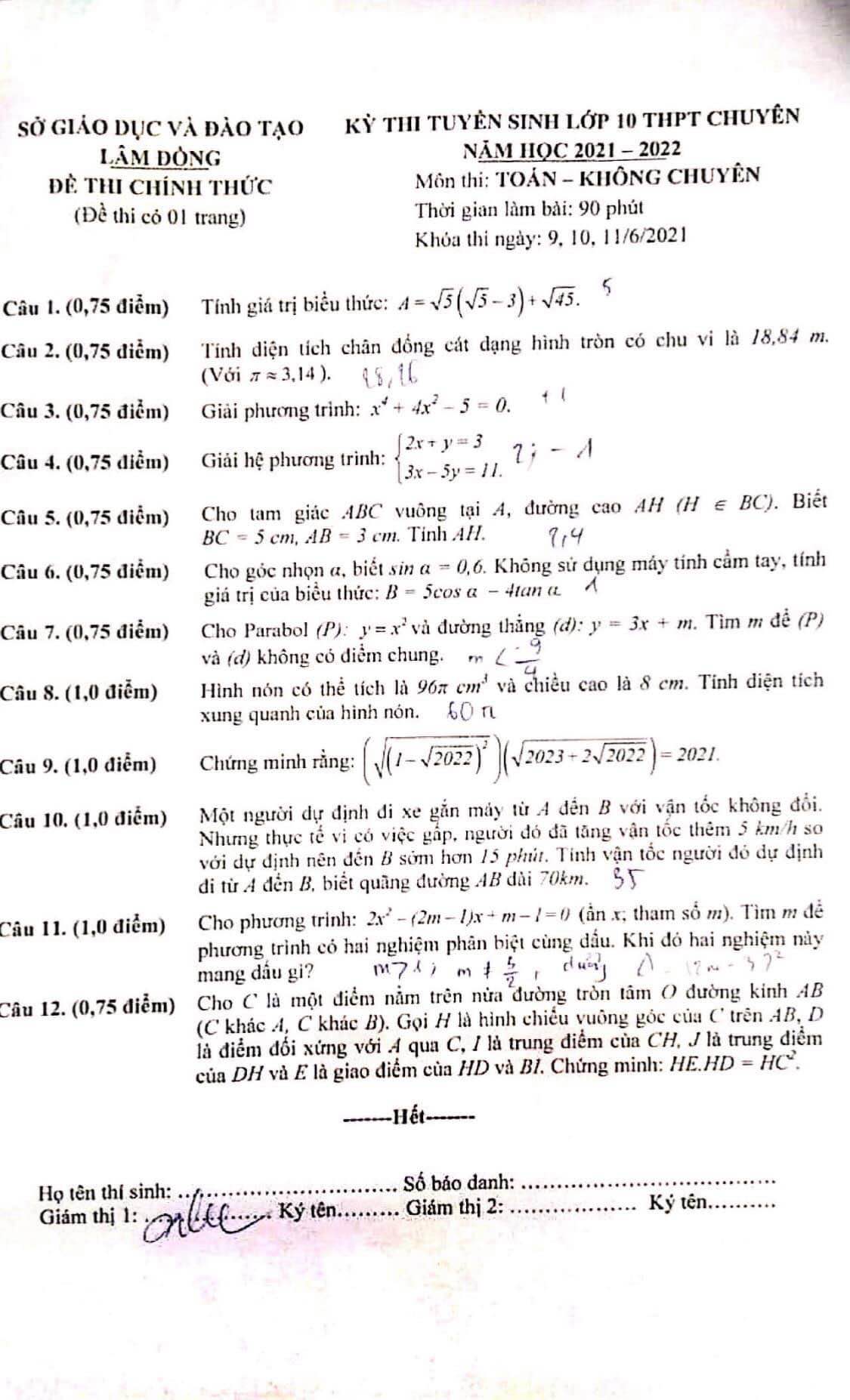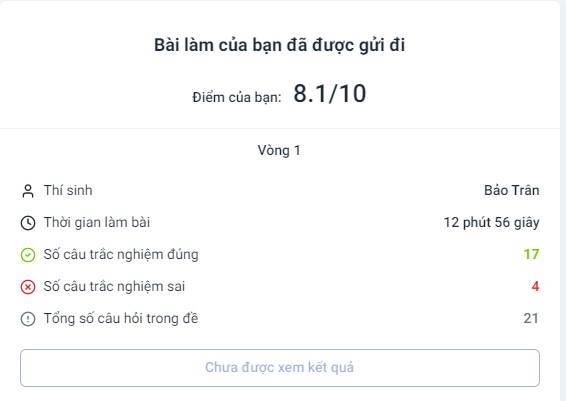Hãy nhập câu hỏi của bạn vào đây, nếu là tài khoản VIP, bạn sẽ được ưu tiên trả lời.

theo ý kiến của mk thì trên VMF cập nhật rất đầy đủ , 31,32 đề quá đủ dùng rồi

Câu 4b:
Ta có \(a-\sqrt{a}=\sqrt{b}-b\Leftrightarrow a+b=\sqrt{a}+\sqrt{b}\). (1)
Áp dụng bất đẳng thức Cauchy - Schwarz ta có:
\(a^2+b^2\ge\dfrac{\left(a+b\right)^2}{2};\sqrt{a}+\sqrt{b}\le\sqrt{2\left(a+b\right)}\).
Kết hợp với (1) ta có:
\(a+b\le\sqrt{2\left(a+b\right)}\Leftrightarrow0\le a+b\le2\).
Ta có: \(P\ge\dfrac{\left(a+b\right)^2}{2}+\dfrac{2020}{\left(\sqrt{a}+\sqrt{b}\right)^2}\) (Do \(a^2+b^2\ge\dfrac{\left(a+b\right)^2}{2}\))
\(=\dfrac{\left(a+b\right)^2}{2}+\dfrac{2020}{\left(a+b\right)^2}\) (Theo (1))
\(\Rightarrow P\ge\dfrac{\left(a+b\right)^2}{2}+\dfrac{2020}{\left(a+b\right)^2}\).
Áp dụng bất đẳng thức AM - GM cho hai số thực dương và kết hợp với \(a+b\le2\) ta có:
\(\dfrac{\left(a+b\right)^2}{2}+\dfrac{2020}{\left(a+b\right)^2}=\left[\dfrac{\left(a+b\right)^2}{2}+\dfrac{8}{\left(a+b\right)^2}\right]+\dfrac{2012}{\left(a+b\right)^2}\ge2\sqrt{\dfrac{\left(a+b\right)^2}{2}.\dfrac{8}{\left(a+b\right)^2}}+\dfrac{2012}{2^2}=4+503=507\)
\(\Rightarrow P\ge507\).
Đẳng thức xảy ra khi a = b = 1.
Vậy Min P = 507 khi a = b = 1.
Giải nốt câu 4a:
ĐKXĐ: \(x\geq\frac{-1}{2}\).
Phương trình đã cho tương đương:
\(x^2+2x+1=2x+1+2\sqrt{2x+1}+1\)
\(\Leftrightarrow\left(x+1\right)^2=\left(\sqrt{2x+1}+1\right)^2\)
\(\Leftrightarrow\left(x+1\right)^2-\left(\sqrt{2x+1}+1\right)^2=0\)
\(\Leftrightarrow\left(x+1-\sqrt{2x+1}-1\right)\left(x+1+\sqrt{2x+1}+1\right)=0\)
\(\Leftrightarrow\left(x-\sqrt{2x+1}\right)\left(x+\sqrt{2x+1}+2\right)=0\)
\(\Leftrightarrow\left[{}\begin{matrix}x-\sqrt{2x+1}=0\left(1\right)\\x+\sqrt{2x+1}+2=0\left(2\right)\end{matrix}\right.\).
Ta thấy \(x+\sqrt{2x+1}+2>0\forall x\ge-\dfrac{1}{2}\).
Do đó phương trình (2) vô nghiệm.
Xét phương trình (1) \(\Leftrightarrow x=\sqrt{2x+1}\)
\(\Leftrightarrow\left\{{}\begin{matrix}x\ge0\\x^2=2x+1\end{matrix}\right.\)
\(\Leftrightarrow\left\{{}\begin{matrix}x\ge0\\\left(x-1\right)^2=2\end{matrix}\right.\)
\(\Leftrightarrow\left\{{}\begin{matrix}x\ge0\\\left[{}\begin{matrix}x-1=\sqrt{2}\\x-1=-\sqrt{2}\end{matrix}\right.\end{matrix}\right.\)
\(\Leftrightarrow\left\{{}\begin{matrix}x\ge0\\\left[{}\begin{matrix}x=\sqrt{2}+1>0>-\dfrac{1}{2}\left(TM\right)\\x=-\sqrt{2}+1< 0\left(\text{loại}\right)\end{matrix}\right.\end{matrix}\right.\).
Vậy nghiệm của phương trình là \(x=\sqrt{2}+1\).

câu: 7:
pt hoành độ giao điểm : \(x^2=3x+m< =>x^2-3x-m=0\)
\(\Delta=\left(-3\right)^2-4\left(-m\right)=9+4m\)
để (P) và(d) không có điểm chung\(< =>9+4m< 0< =>m< \dfrac{-9}{4}\)
Vậy ....
Câu 6
Áp dụng hệ thức: \(\sin^2\alpha+\cos^2\alpha=1\Rightarrow\cos^2\alpha=1-\sin^2\alpha\)
\(\Rightarrow\cos^2\alpha=1-0,6^2=0,64\)
\(\Rightarrow\cos\alpha=\pm0,8\)
Mà \(\alpha\) là góc nhọn nên \(\cos\alpha>0\) do đó \(\cos\alpha=0,8\)
Ta có: \(\tan\alpha=\dfrac{\sin\alpha}{\cos\alpha}=\dfrac{0,6}{0,8}=0,75\)
Khi đó \(B=5\cos\alpha-4\tan\alpha=5.0,8-4.0,75=1\)

https://www.facebook.com/groups/2001.Toanhoc.Tuyensinh247/?ref=bookmarks
https://www.facebook.com/groups/1536108143358493/?ref=bookmarks

Cái này phải mua bạn nhé, xem tại đây http://www.davibooks.vn/products/view/42824.Tai-Lieu-Chuyen-Toan-Trung-Hoc-Co-So-Toan-9-Tap-1-dai-So.html


